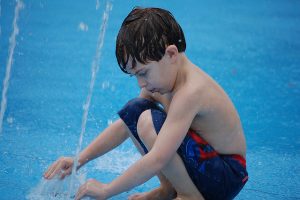As the phase of discovering your children begins around the first year of life, parents become truly alert to every kind of movement, development, and new learning. Especially if they already have an older child, comparisons in one child’s development to the other are inevitable and this often leads to a lot of worries for parents.
Some of these concerns are unfounded, but others deserve greater attention and should be watched closely, and any suspicion should be reported to the pediatrician. Some signs of delay really are alerts that something is wrong, and they may be caused by various reasons—one of them is autism. Autism is a developmental disorder that is usually noticed in the early years of a child’s life. You often notice the difference in the child’s social interaction with others, and in the way they act in happy or anxious situations, displaying very common signs of autism.
The condition is hereditary and may also occur due to some genetic predisposition from the parents, although nothing is scientifically proven yet. Autism directly affects brain processing, making learning and developing certain skills more difficult, and it mainly affects boys. There are various types of autism, each with different levels of difficulty, including the Autism Spectrum Disorder (ASD), Asperger Syndrome, and PDD-NOS (Pervasive Developmental Disorder – Not Otherwise Specified).
Signs of Autism and How They Interact with Others
The first signs observed by parents and doctors are the lack of expression and communication in these children. The fact that they perform repetitive acts and movements also draws a lot of attention, as well as gestures with hands and feet, which are very characteristic symptoms of autism. Many autistic children have different reactions when exposed to certain kinds of light, sound, or even touch, such as a hug. A gesture so common and widely used by humans, and which expresses affection, can be a source of great stress for some autistic people. Because it is a condition that is not visible and is not considered a physical disability, it can be quite complicated for those around them—especially strangers—to understand their behavior.
Children with autism tend to have difficulty answering questions and following recommendations or instructions. They struggle to carry on a conversation or elaborate on a topic, and when they express themselves, they tend to speak only about subjects they are personally interested in. Others simply cannot speak, being unable to develop speech. One of the most prominent aspects of autism is the inability to interact with other children, and a reluctance to share activities. Even if they want to play with others, they do not know how. They find it very difficult to meet new people and have contact with them—very typical symptoms of autism which define children living in their own world.
Repetitive movements, especially rocking the body forward and backward, are very clear signs of autism. They may spend long periods walking in circles with their arms held tightly against their bodies, making gestures with their arms for no apparent reason.

Living with a child with autism requires a lot of patience and above all, a lot of affection. Stimulation is essential, especially when you notice an interest in a specific subject. This activity, game, or topic can be used more often or explored in activities that help the child open up more—and perhaps even make friends with similar interests and tastes?
Find ways to help them communicate more easily; if they like to show situations through drawings, encourage them to draw; if they enjoy the sound of a musical instrument, support that. In stressful moments, remove the child from the location and take them somewhere quieter and more private, where they can calm down. The involvement of teachers and psychotherapists together with family is essential for the better development of a child with autism. Each one will progress at their own pace, and should not be pressured to advance. Praise them every time they manage to do something different and celebrate each new discovery with them. Over time, they will adapt and communicate increasingly better with the world, each in their own way.
See also: Autism – What Is It Anyway? Testimonial by Mom Karine
Photo: Camp ASCCA












